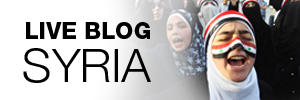Cousin of Syrian president ‘quits business’
Tycoon Rami Makhlouf, under sanctions for corruption, moves to charity in apparent concession to protesters.

 |
| An end to corruption has been one of the key demands of Syrian protesters [Reuters] |
Rami Makhlouf, a cousin of President Bashar al-Assad and focus of anti-corruption protests, is quitting business and moving to charity works, state media says.
The announcement by the Syrian business tycoon was seen as a concession to anti-government protesters, who were expected to take to the streets again on Friday.
In a statement, Makhlouf said he took the decision to quit because he no longer wants “to be a burden on Syria, its people and its president”.
Makhlouf will channel his wealth into charity and development projects, according to Syrian television.
“As for his businesses, they will be directed so that they … create jobs and support the national economy. He will not enter into any new project that [brings] him personal gain,” the report said on Thursday.
 |
Makhlouf controls several businesses including Syriatel, the country’s largest mobile phone operator, duty free shops, an oil concession, airline company and hotel and construction concerns, and shares in at least one bank.
State news agency SANA quoted Makhlouf as saying he will put his 40 per cent holding in Syriatel up for sale in an initial public offering, with profits allocated to humanitarian work and families of those killed in the unrest.
Offices of Syriatel were some of the first buildings to be torched by demonstrators as protests first erupted in Deraa in mid-March, as the company and Makhlouf are seen as symbols of Syria’s widespread corruption.
Makhlouf has been subject to US sanctions since 2007 for what the US calls public corruption, as well as EU sanctions imposed in May, but repeatedly maintained he is a legitimate businessman whose firms employ thousands of Syrians.
‘Random arrests’
After the announcement of Makhlouf’s new plans, nightly demonstrations were held in the Damascus district of
Qaboun, Dael in the southern province of Deraa, Deir al-Zour in the east of Syria, and the central city of Homs.
Syrian rights groups say 1,300 civilians and more than 300 soldiers and police have been killed since the uprising began.
The latest focus of the crackdown has been in Idlib province in the northwest of the country, around the town of Jisr al-Shughur where authorities say 120 security personnel were killed earlier this month.
Syria-based rights activist Mustafa Osso said large numbers of soldiers entered Maarrat an-Numan early on Friday, after the army had surrounded the town and nearby Khan Shaykhun on the main north-south road linking Damascus and Aleppo.
Omar Idilbi of the Local Coordination Committees activist network said troops were in full control of Marraat an-Numan.
Activists said security forces swept through villages and towns in the area on Thursday, randomly arresting
males over age 16.
The detentions were concentrated on Jisr al-Shughur and Maarrat An-Numan and in nearby villages, Osso said.
Military operations in Idlib province have prompted more than 9,000 Syrians to stream north across the border into Turkey. Thousands are also sheltering inside Syria close to the border.
Turkish officials are preparing to send food, clean water, medicine and other aid to thousands more stranded on the Syrian side.
“We have taken precautions and humanitarian aid will be supplied for around 10,000 people who are waiting on the Syrian side of the border,” Ahmet Davutoglu, the Turkish foreign minister, said after he met with an envoy from Assad on Thursday.
He also reiterated Turkey’s support for major democratic reform in Syria.
Meanwhile, the UN chief said he had spoken to Assad and urged him to halt the violent crackdown on demonstrations.
“I again strongly urge President Assad to stop killing people and engage in inclusive dialogue and take bold measures before it’s too late,” Ban Ki-moon said in Brazil.